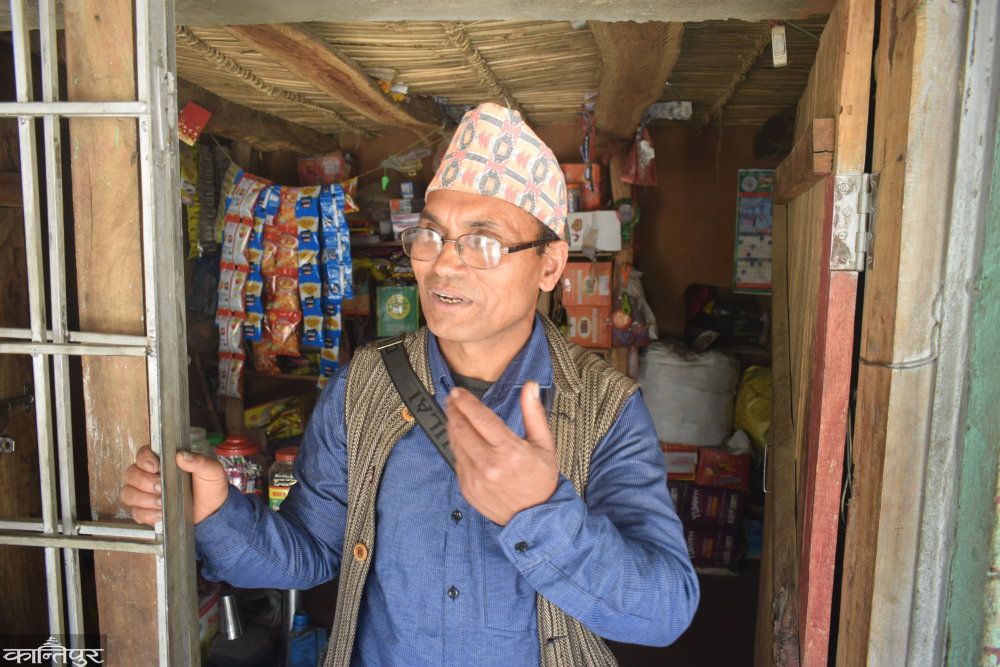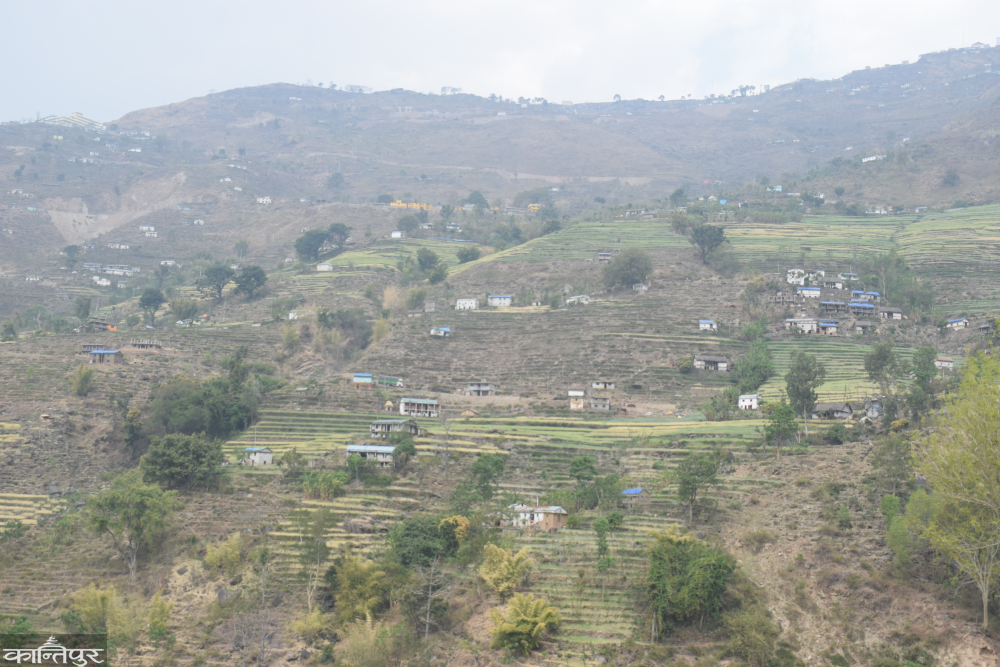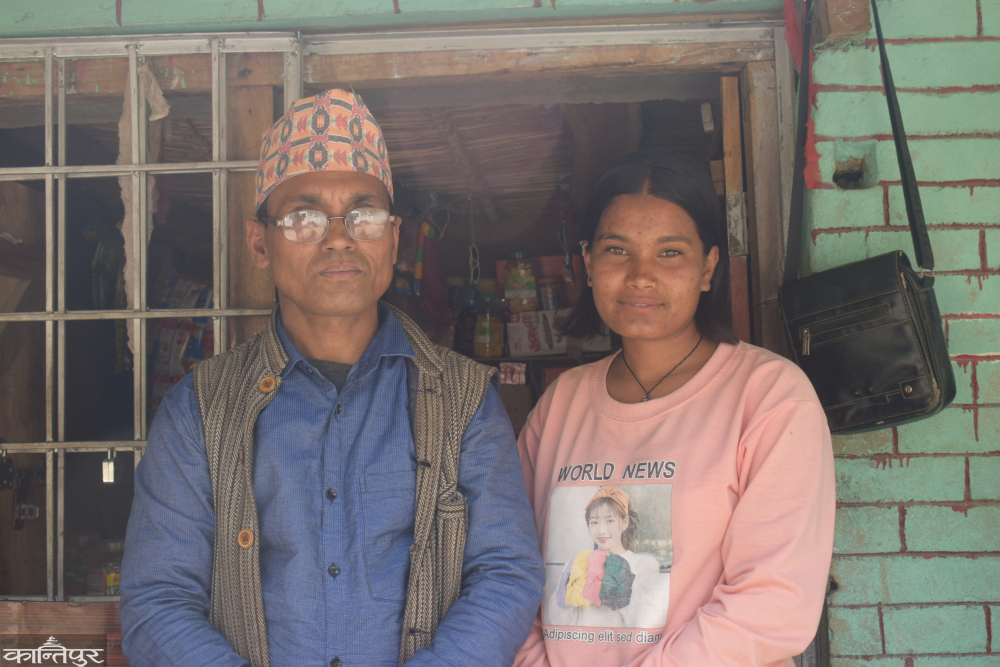Wounded of armed conflict - "beat the stones, save life"
We use Google Cloud Translation Services. Google requires we provide the following disclaimer relating to use of this service:
This service may contain translations powered by Google. Google disclaims all warranties related to the translations, expressed or implied, including any warranties of accuracy, reliability, and any implied warranties of merchantability, fitness for a particular purpose, and noninfringement.


There is Zhurupp Dalit settlement around Khandachakra Municipality-2, Vasantabada. There are about 300 houses in the village. Along the Karnali Highway, there is a road-side checkpoint. 50-year-old Devsingh Vick, the leader of the village, runs a small grocery store in the same village.


Along with the shop, there are piles of stone and gravel on the roadside. Devsingh will go to the store when the people who buy it, or else they will climb on the pile of stones and start breaking the gravel . His wife also grinds gravel there. The children are also working.
"There is not a lot of land, the produce I produce is not enough to eat for three months," Devsingh pointed to the paddy and said, "I have built this paddy, but it is not enough." That's why I will grind this gravel . There are children, he had to eat, he had to take care of him, he had to do the work no matter what.
Devsingh, who joined the Maoists in 1955, then went underground, and spent about eight years completely in the Maoists . "If I had not joined the Maoists, I would have been working in Mumbai, or working somewhere in the Terai," says Devsingh, "I was injured in the conflict, I learned a lot by joining the party, and the village also changed." After that, I didn't want to go abroad.'
He doesn't hear well in his right ear. He was hit by shrapnel during the armed conflict. "This ear does not work, it could not be treated." They say that during the armed conflict, it was hit by gunpowder, the eardrum was broken,'' he said, showing the letter of the injury on the ear, 'It was injured, but nothing was found . The government will only give to those who are on the injured list.'
Injured from the armed conflict, he is very dissatisfied with the behavior of the leaders after the armed conflict. He alleged that the leaders gave facilities and opportunities only to those close to them. However, even now he is proud of the armed conflict. He says that the Dalits who were living the life of slaves in Kalikot during the armed conflict were given the right to eat.

Before the start of the armed conflict, there was no limit to injustice and atrocities on Dalits in the village. He said that fathers and sons had to suffer a lot for them. He knew that it would not be tolerated, that's why he started the armed conflict.'
Maoists were studying at school when the armed conflict started. A thatched roof school. But at that time, it used to be hot in the school, even the teachers used to touch the water and beat them . No one wanted a Dalit to do well in school. "Father used to work and teach". But I couldn't read much, I didn't have the environment to read,' Devsingh said, remembering old things, 'After studying up to 7th, I also started going to India with my father.' He went to India for two years to work as a laborer. On the other hand, the Maoist conflict intensified, and the influence in the village increased . Then he also returned to the village and joined the Maoists.
'At that time, when I returned from India, I would have a little money . But Dalits in the village were not supposed to wear good clothes. If a Dalit wears glasses, they would take them off and throw them away. He used to like wearing good sandals,'' he says, 'due to the armed conflict, now we don't have to tolerate such things again in the village. Thakurisaabs don't dare to say Dum, Kamara. In fact, it is the armed conflict that has taught everyone that Dalits should also be able to live with dignity.'
That is why Devsingh is still struggling within the Maoists. Member of the District Committee Secretariat, he was previously elected as a ward member in the election of 074. This time he claimed to be the ward president. But the party did not give him a ticket . "In our ward, Dalits are almost 60 percent". But the party does not give tickets to Dalits,'' he says, 'the practice of sniping like before has reduced now . But when Dalits are given opportunities or when they have to achieve political access, Brahminical thinking comes forward.'
Kalikot is the district with the largest number of Dalits in the country. Not only that, it is a district with weak indicators in terms of poverty, malnutrition and awareness. But the local government does not want to work for Dalits. He says that to remove the poverty of the district, the standard of living of Dalits should be raised rather than being heard.

'Armed conflict brought many reforms . After that, for a few years, the boroughs also gave budgets for the empowerment of Dalits," says Devsingh, "The constitution was written, the constitution gave privileges to Dalits. But in practice, the government at all three levels does not seem to want to invest.'
When he himself was a member of the ward, he tried to work for the empowerment, capacity development and self-employment of Dalits in the ward. Even within the party, they have been pressuring Dalits to make local policies, programs and plans. But he complains that it is not heard.
'Now the party has also broken . Now there is a situation like saying, "He who sells his mouth also sells his rice, but his mouth does not sell his rice." Those who have access within the party took everything, we could not reach out,' he says, 'it is difficult for those who only contribute to the party to get opportunities. Leaders have taken advantage of the community rather than looking at their contributions.
After federalism, he said that even though he tried to do some work for the upliftment and empowerment of Dalits in his own village, he did not get any help. According to him, all Dalit households in the village are run by labour. Most of them don't have enough food for three months with the products they make . Then they either go to India to work, or they do small labor in the village to make ends meet.
He says, "Working makes you happy in the evening and in the morning". But in case of illness, there is no good treatment, the good education of the children has become even more far-fetched. Dalits still don't have the awareness that they should be educated and their children should be educated.
He said that even though he drew attention to the local level to invest for the development of the capacity of Dalits, there was no hearing. Also, he is now a member of the city-level citizen working group. But he says that citizens' voices are no longer being heard at the local level. "Those who are powerful are heard everywhere, but no one supports the suffering of ordinary citizens, not even the local government," he says. break Having spent eight important years of his life in the party, he is now the father of three sons and three daughters. He said that he missed the studies when he was involved in the armed conflict and after getting married, he studied with his daughter and wrote SEE. "I passed SEE with my daughter because I was not able to study before, and now I am not studying enough," he said.
He wrote SEE in 074 along with his elder daughter Devitara . Then the daughter is doing the previous studies . He said that he left because he could not deliver both time and money.
His eldest son also wrote SEE last year . "After enrolling in class 11, my son has gone to Mumbai, now it's time to take the exam," said Devsingh. He complains that he did not get any help when the party leaders were in power.


 २५.१२°C काठमाडौं
२५.१२°C काठमाडौं















